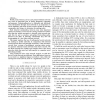Free Online Productivity Tools
i2Speak
i2Symbol
i2OCR
iTex2Img
iWeb2Print
iWeb2Shot
i2Type
iPdf2Split
iPdf2Merge
i2Bopomofo
i2Arabic
i2Style
i2Image
i2PDF
iLatex2Rtf
Sci2ools
127
click to vote
WIMOB
2008
IEEE
2008
IEEE
Exploiting Self-Reported Social Networks for Routing in Ubiquitous Computing Environments
— Mobile, delay-tolerant, ad hoc and pocket-switched networks may form an important part of future ubiquitous computing environments. Understanding how to efficiently and effectively route information through such networks is an important research challenge, and much recent work has looked at detecting communities and cliques to determine forwarding paths. Such detected communities, however, may miss important aspects. For instance, a user may have strong social ties to another user that they seldom encounter; a detected social network may omit this tie and so produce sub-optimal forwarding paths. Moreover, the delay in detecting communities may slow the bootstrapping of a new delay-tolerant network. This paper explores the use of self-reported social networks for routing in mobile networks in comparison with detected social networks discovered through encounters. Using encounter records from a group of participants carrying sensor motes, we generate detected social networks from th...
| Added | 01 Jun 2010 |
| Updated | 01 Jun 2010 |
| Type | Conference |
| Year | 2008 |
| Where | WIMOB |
| Authors | Greg Bigwood, D. Rehunathan, Martin Bateman, Tristan Henderson, Saleem N. Bhatti |
Comments (0)

